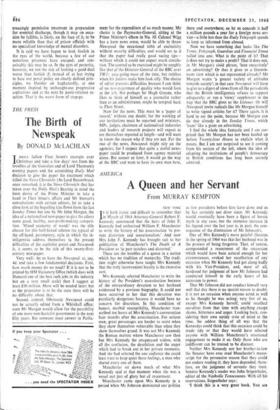The Birth of Newspeak
THE PRESS
By DONALD McLACHLAN
T SHALL follow Fleet Street's example over 'Christmas and take a few days' rest from the troubles of the Guardian and of Lord Thomson's evening papers and the astonishing Daily Mail decision to give the paper the treatment which killed the News Chronicle. (As Lord Beaverbrook once remarked, it is the News Chronicle that has taken over the Daily Mail.) Bearing in mind the keen desire of the Prime Minister to take a hand in Fleet Street's affairs and Mr Stewart's consultations with certain editors, let us take a close look at the beguiling kite flown from the last Sunday Times but one by Mr John Morgan, the idea of a nationalised newspaper to give the others some good, healthy, non-profit-making competi- tion. 'Mixed economy of words' was the title chosen for this half-baked scheme (so typical of the off-hand, peremptory, style in which the in- telligentsia address themselves to the present difficulties of the capitalist press) and Newspeak is, it seems, to be the title of this twenty-first- century newspaper.
Very well: let us have the Newspeak at, say, 4d. and take a few fundamental decisions. First, how much money do we need? If it is not to be printed by HM Stationery Office (which does with Hansard one of the best rush jobs in the industry but on a very small scale) then I suggest at least £10 million. More will be needed later; but as the proprietor is to be the state there will be no difficulty about that.
Second, control. Obviously Newspeak could not be actually edited from a Whitehall office; even Mr Morgan would allow for the possibility of one more non-Socialist government in the next fifty years. But someone must answer in Parlia- meat for the expenditure of so much money. My choice is the Paymaster-General, sitting at the Prime Minister's elbow in No. 10. Colonel Wigg has a keen news sense, would be able to throw Newspeak the occasional titbit of exclusivity without security difficulties, and would see to it that the paper had really good racing tips— without which it could not expect much circula- tion. The control to be exercised might be roughly like that of the Director-General of the BBC over TW3: easy-going most of the time, but ruthless when his juniors make him look silly. The choice of editor presents difficulties because I can think of no newspaperman of quality who would look at the job. But perhaps Sir Hugh Greene, who likes to think of himself as a journalist rather than as an administrator, might be tempted back to Fleet Street.
Now for the news. This must be a 'paper of record,' without any doubt; for the working of our institutions must be reported and ministers, MPs, judges, chairmen of nationalised industries and leaders of research projects will expect to see themselves reported at length—and will want to know the reason why if they are not. For the rest of the news, Newspeak might rely on the agencies; for I suspect that quite a useful news- paper could be produced from agency material alone. But sooner or later, it would go the way of the BBC and want to have its own man here, there and everywhere; so let us concede it half a million pounds a year for a foreign news ser- vice—a little less than the Daily Telegraph spends to keep us informed from abroad.
Now we have something that looks like The Times, Telegraph, Guardian and Financial Times rolled into one. What is the point of it? That it does not try to make a profit? That it does not, in Mr Morgan's vivid phrase, 'lean excessively' on advertising? Or that it gives us a Govern- ment view which is not represented already? Mr Morgan wants 'a greater variety of attitudes towards society'; in that case Newspeak will have to give us a digest of views from all the periodicals that the British intelligentsia refuses to support adequately; or run a `viewy' supplement in the way that the BBC gives us the Listener. Or will Newspeak invite radicals like Mr Morgan himself to write signed articles for it? There again, it is hard to see the point, because Mr Morgan can do that already in the Sunday Times, which `leans' like a giant on advertising.
I find the whole idea fantastic and I am sur- prised that Mr Morgan has not been hauled up before Twenty-four Hours to explain what it means. But I am not surprised to see it coming from his section of the left, where the idea of adapting the institutions of people's democracy to British conditions has long been secretly admired.






























 Previous page
Previous page